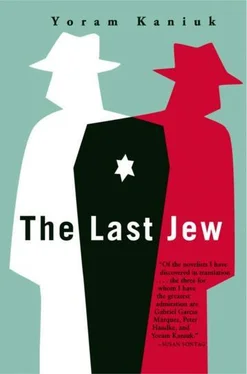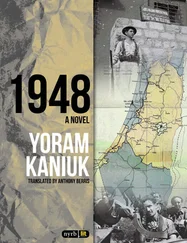Sam stood up surprisingly and informed them that he missed the girls of Gillette. They aren't seeking a messiah in the plains of Connecticut, he said, they simply belonged, he yelled. We went to the theater. He said something had to be fixed in the sections that were performed for him, and the girls gave him a gift of a green cotton shirt that said "Smith College-a hundred years of superior girls." They played coins like those my mother played when she was a student here. It was late at night, and the sound was clear and terrifying. People came from the television station in Hartford to interview him, but he refused to be interviewed. Licinda bent her thumb hard until it broke, and Sam bandaged it and said: Tell her how much I love her. Licinda wept, but maybe she wept because of the pain. When we came back to New York, there was a storm and we landed in a cloud of snow. We went to their house and Sam told Lionel that the gentile girls stood naked in a church and sang his La- mentsfor the Death of the Jews holding candles and were amazingly beautiful. Licinda went to the doctor and returned with a cast on her thumb. At night she lay with a thermometer in her mouth. Sam kept asking her what her temperature was, and she showed him her temperature with her fingers, but she didn't take the thermometer out of her mouth. They stole the destruction from me, said Sam, they made a play devoid of any risk or dread for the terrific girls of Gillette, that's how you get rich in America.
When he went to the Delmonico Hotel, I went with him. People were sitting around tables with bottles of wine and soda on them and turkeys and plates of pastry and vegetables and sweets. At the head table sat about ten dignitaries, and one of them said: Here's Sam Lipp, who has at long last deigned to honor us with his presence. And Sam, the focus of all eyes, stopped for a moment and asked in a loud voice: Where do I go? And the man said to him: To the table marked "Children of the Camp." I stayed at the end of the hall next to the journalists and in the distance I could understand how uneasy he was. Later he told me that when he sat there, he saw those people as they had been in April 'fortyfive. With Ebenezer's eyes he saw them, and they were all dead, he added. When they applauded him, he stood up and applauded them. People at the head table talked, one after another. Behind them hung a sign: "Twenty-five Years of Liberation," and a gigantic picture of a concentration camp hung there. And then Sam got up went to the stage, whispered with one of the dignitaries, and the man smiled and there was a hush and Sam picked up the microphone, started walking back and forth, eyes fixed on the hundreds of people sitting around turkey and bottles of wine, and said: I was born in the wrong place, because they put me at the wrong table. I wasn't born in a camp but in my mother's house. Why are the tables arranged like that? Why not by professions: tooth extractors, gravediggers, experts in diamonds, in gold teeth?
The murmuring in the hall started right from the start. You're the only family I've got, he said, not paying attention to what was going on, except for Mr. Brooks, the father of my beloved Melissa, but she didn't wait for me either. What nerve is it to assemble every year like this? We should have devastated Europe and not be eating turkey, but we didn't. We should have destroyed America, who threw us to the dogs, but we're getting rich and living off her. We had Einstein and Oppenheimer and Teller, why didn't we ask them to devastate the Western world instead of Hiroshima? SS Kramer was more reliable. Until the last minute, he knew who the enemy was and what he had to do. Ebenezer knew too and as far as he's concerned, you're all dead.
He looked at them. After a few minutes, he started singing and they joined in, one by one, and sang a song called "Nieder- landisches Dankgebet" as if he had hypnotized them. The head table sang too. They stood like slaughtered peacocks who had remained alive a few seconds, their eyes shut and sang innocently and devotedly, and the hall shook and the microphone whistled and screeched, and only the man sitting next to Sam looked pale and waved his hands, his name (I know because I saw him on television) was Eliahu Wiggs. He pushed Sam and slapped his face and the hubbub prevailed and Sam went on singing and everybody went on singing and then they assaulted the tables like a routed army and we left there.
You cannot understand, or you can understand better than anybody, how strange it is for a person like me to write these things. My background, my position, everything I was and did didn't prepare me for this week, but when you visited us, something snapped in me that may have been lying inside me for many years, that damn intimacy, almost despair, was born, something like closeness, to people who hundreds of years ago had cleared the forests of New England, burned in a foreign fire. As if I wanted to restore to Christianity what Sam Lipp, Lionel, and even you hold in your hand-some profound hatred, a shadow of a jealous and cruel God.
Before he ran away from the hall with Eliahu Wiggs's slap stuck to his face, he managed to take a few cookies. He stood at the cloakroom and with trembling hands he tried to put on the coat. He held the cookies in his mouth so his hands would be free. Eliahu Wiggs, furious, came out and yelled at him, but Sam couldn't answer him because his mouth was full of cookies. And suddenly I saw how two people could be hungrier than I ever knew. Eliahu wanted to slap Sam's face again, but the sight of the cookies was so attractive that he started weeping, quietly, and his hand that wanted to hit stuck to his body again, he turned his face right and left, and I thought: Those aren't the artificial tears Sam talked about before. With his skinny hand, he grabbed one cookie from Sam's mouth and started chomping it hungrily, and Sam held the cookies tight in his mouth and Eliahu wanted more and had to bring his thin, beautiful face close to Sam's mouth to snatch more, and suddenly it didn't matter what I or others saw, he put his face close and bit and Sam almost kissed him on the mouth and the two of them hugged or wrestled, and tears rolled on their cheeks and then Eliahu Wiggs pulled away, tears flowing on his cheeks, and disappeared into the hall.
We got into a taxi and Sam wanted to sleep for an hour, paid the driver in advance, apologized to him and me, and fell asleep. I sat and pondered what I was doing with him in a taxi, at night, in the cold, and the driver talked about the weather and about the near-accident of the Swissair flight at Kennedy Airport when he went there earlier, and then Sam woke up and asked the driver if he had aftershave and Sam got aftershave from the driver and sprayed a little on his face and told him to drive home.
I took Sam to my house. He and Licinda stayed with us for three days. We looked at them yearningly. My wife hugged him, drank too much, and said: If you want, you can marry Melissa, and she passed out. We took her to the hospital and she's been there for a month. I sit at her side and ask myself, What disaster did I bring down on her and on me? and I have no answer.
Yours,
A. M. Brooks
Tape / -
Greta Garbo as Ninotchka goes into a restaurant. She says to the waiter: Give me coffee without cream. A few minutes later, the waiter comes back and says: We have no cream, Madame. Is it all right without milk?
In my reflection she is I, she's my memory, she's the fact that maybe it will finally be revealed that I had no father. Not Nehemiah, not Joseph, an impure spirit of holiness entered my mother in the river. The river is my father. Old is my mother and cruel. Samuel is my son. Where are you, dear Samuel?
Tape / -
Dear Obadiah,
Some time ago, my phone rang at home and Sam Lipp, who was on the line, informed me that he had come to town and was living in a Lebensborn inn.
Читать дальше












